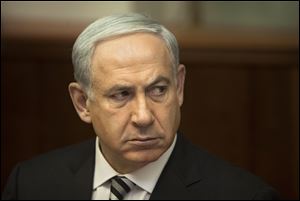
On the edge
Israel and Hamas both have upped the ante in their continuing struggle, but why now?
11/20/2012Violence between Israel and Hamas in the Gaza Strip is so commonplace that the international community no longer asks why, but why now? In a Middle East that is more volatile than it has been in years, that’s an important question.
Who started it this time? Each side blames the other. Each claims its use of violence is a just response to an intolerable provocation.
Israel points to an explosion in a mine along the Israeli border that Hamas claimed credit for, and a missile strike on an Israeli military jeep in which four soldiers were seriously injured.
Hamas cites the Nov. 5 shooting by Israeli forces of a 23-year-old Palestinian man as he approached a border fence. On Nov. 8, a 13-year-old Palestinian boy was shot to death while he was playing soccer outside his home.
The result was predictable: Hamas began firing more rockets into Israel, which responded by targeting dozens of rocket launchers in Gaza, especially ones that fire Iranian missiles capable of striking targets deep in Israel.
Last week, an Israeli drone launched a missile that blew up the car in which a Hamas military leader was riding. The attack that killed Ahmed al-Jabari was reminiscent of assassinations Israel seemed to have abandoned in recent years.
Israeli peace activist Gershon Baskin told the Israeli newspaper Haaretz that Mr. Jabari was in the final stages of negotiating a permanent truce with Israel. That has led to speculation that Mr. Jabari died because Israel doesn’t want peace with Hamas — at least not now.
The death toll in the region has surpassed 100. Israel is targeting the homes of suspected Hamas leaders. These actions have enraged Palestinians, could cause other Arab nations to flock to the Palestinian cause, and may endanger support for the Jewish state from the rest of the world.
Israel has set parliamentary elections for January. Are Prime Minister Benjamin Netanyahu and the ruling Likud party polishing their military hard-line credentials? Analysts say that it wouldn’t be the first time.
Mr. Netanyahu may be trying to send a message to the Obama Administration as well. Most Israelis evidently would have preferred the election of Republican presidential nominee Mitt Romney. Mr. Netanyahu has encouraged the perception that President Obama is hostile toward Israel and weak on Iran and growing Islamic radicalism.
But if what Israel has unleashed is stagecraft, as some in the United States suggest, it did not occur in a vacuum. Beyond the continuing threat of a nuclear Iran, the Middle East and North Africa are in the throes of changes that are bound to affect Israel.
If civil war in Syria topples the government of Bashar Assad, it could result in chaos, or the rise of a more Islamist regime. Fighting there also threatens to destabilize Lebanon, where the Syria-backed militant group Hezbollah holds sway along Israel’s northern border.
Israel has long-standing peace treaties with Egypt and Jordan. But Egypt’s new Muslim Brotherhood-led government is walking a tightrope between support for the Palestinian cause and its desire to be seen as a responsible player in regional politics.
At the same time, recent protests in Jordan over reduced gasoline subsidies have turned deadly and led some opposition leaders to call for the overthrow of King Abdullah II.
Egypt and Tunisia, with whom Israel also has diplomatic ties, have sent delegations of support to Gaza. Egypt is working behind the scenes to broker a truce. The United States, which backs Israel’s right to defend itself, still worries as Israel threatens to send troops into Gaza.
Israeli-American writer Emily Hauser told the Atlantic magazine that between Israel and the Palestinians, there will always be “something or someone to avenge.”
Even in the best of times, it can be difficult to pinpoint what motivates either side. But lighting matches in the Middle East is never a good idea.

Israeli Prime Minister Benjamin Netanyahu attends the weekly cabinet meeting in his Jerusalem office, Sunday, Nov. 11, 2012. Netanyahu says his country is ready to strike harder against Gaza Strip militants if they don’t stop attacking Israel. (AP Photo/Sebastian Scheiner, Pool)